Peter MALONE
Saturday, 18 September 2021 20:00
Nell
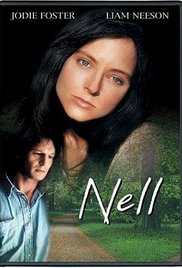
NELL
US, 1994, 112 minutes, Colour.
Jodie Foster, Liam Neeson, Natasha Richardson, Richard Libertini, Nick Searcy, Robin Mullins, Jeremy Davies, Sean Bridgers.
Directed by Michael Apted.
Jodie Foster received an Oscar nomination for her role in Nell (having won the award for The Accused in 1988 and Silence of the Lambs in 1991).
Here, she plays an adult who is seen as a wild child, her mother having been raped and giving birth to twins who lived out in the forests of North Carolina, one of the twins dead, and, at the opening of the film, her mother dying. She is discovered by the visiting doctor, played by Liam Neeson, who consults the child psychologist, Natasha Richardson, and together they are given three months by the courts to work with Nell.
The doctor wants to live in the forest and observe Nell while the psychologist wants her to come in and receive treatment, this being supported by an expert doctor. They both live in the forest, he in a tent, she in a boat and she sets up a video camera to observe Nell. Nell speaks her own language, influence by her dead mother who had had a stroke and spoke in a deformed manner. Gradually, Nell trusts the doctor, he begins to understand the language, shares with the psychologist – but, ultimately, Nell is found and the media come.
When Nell is taken into the hospital for treatment, the doctor takes her away to a motel and he and the psychologist both help her. During the court proceedings, Nell makes an impassioned speech which the doctor translates.
The film ends five years later, the doctor and the psychologist married with a daughter, and coming to visit Nell and a reunion with all those helped her.
The film was directed by Michael Apted, a veteran of many films in different genres and, especially, the Seven Up series. (And Liam Neeson and Natasha Richardson were married just before the film was released.).
1. An appealing film? Interesting characters? Interesting situations and the way that they were handled?
2. The story of a wild child, in the North Carolina woods, the death of her mother, her growing up in the woods, her being discovered, the response of doctors, psychologists, academics, the media?
3. The North Carolina settings, the beauty of the mountains, the woods, the lakes? The contrast with the ordinary town, shops, bars, police precincts? The contrast with the city of Charlotte, the hospital? The musical score?
4. The origin of the film in a play, adaptation for the screen? The title, Idioglossia, and its indication of interest in language, acquiring language, communication?
5. The opening, the dead woman, the flowers on her eyes? Only the hand seen putting them there?
6. The delivery boy, coming into the woods, the money in the purse, going into the house, discovering the dead body, his reporting to the police? (And later, with his friends, going into the woods, playing pool, the sex talk, the confrontation with Nell and provoking her, Jerry’s reaction?)
7. Jerry, his practice, his wife leaving him, a loner? Going to the hut, finding the body, Nell and her screaming? His accompanying Todd, the role of the police, his apprehensiveness? Todd and his disturbed wife – and her bonding with Nell? Jerry and his deciding how to handle the situation?
8. Jerry going to the centre, watching the child and its erratic behaviour, the teachers, Paula observing, and his explanation of the situation, her interest, the interest of Dr Paley? Paula and her arrival in town, going to find Nell?
9. The different responses, Paula and the doctor, the clinical reaction, wanting Nell to come in for treatment and observation? Taking the blood and the later tests? The academic hopes for tenure and achievement? The contrast with Jerry, his wanting to care for Nell in her own place? Nell and the knife and the realisation that the mother was raped? The newspaper report?
10. Going to court, Jerry and his fierce defence of Nell, the doctor and the clash, Paula? The judge giving them three months?
11. Jerry, in the woods, pitching his tent? Paula, coming on her comfortable boat? The tension between the two? Different methods? Paula placing the camera in the hut and being able to observe Nell’s reaction?
12. Jodie Foster as Nell, the wild child, her attempts at language, acquiring language from her mother, the mother having a stroke and her mouth and face distorted? The audience knowing about the twin sister and the other two having to discover this? Nell’s gestures, especially towards the mirror, remembering her sister, going out on the rocks, swimming? Nell’s language, becoming more at ease with
Jerry?
13. Jerry, his kind attitude, his patients, watching the videos, gradually determining some of the words, beginning to understand, Paula writing down the phonetics, their gradually discovering the twin? And Nell taking them to see the burial place, the flowers on the skeleton?
14. Nell, more at ease, communicating, happy, hearing the bars of the Willie Nelson song – Crazy – and later repeating it at the pool hall?
15. The clashes between Jerry and Paula? Nell trying to reconcile them? Nell and her curiosity, their showing her the book about sexuality – and her saying that one of the photos was Paula and Jerry and wanting them to reconcile and kiss?
16. Observing Nell, on the rocks, naked, swimming? The decision that Jerry would go on the rocks, naked, swimming together – and Jerry with the attraction but no abuse or exploiting a Nell?
17. Persuading Nell to come out into the daylight, the popcorn, her being lured further, her exhilaration and the sunlight?
18. The journalist arriving, Jerry’s anger? The later article in the paper? The media coming, the helicopters?
19. The three months up, taking Nell into town, her riding in the car, looking at the town from her point of view? The supermarket, the collecting of groceries, in the pool room, the taunts, her reaction, then rescued?
20. The court, decisions, for her to be treated by the doctors? Nell and her impassioned speech and Jerry translating it for the court?
21. Jerry, carrying Nell away from the media, the decision to take her from the hospital, in the motel, taking her back, Paula coming, the two looking after her?
22. Five years later, Jerry and Paula with their daughter, coming to the hut, the picnic, Todd and his wife, the women of the town, Don, the little girl playing with Nell?
23. The achievement and her future?
Published in Movie Reviews
Published in
Movie Reviews
Tagged under
Saturday, 18 September 2021 20:00
Boss, The
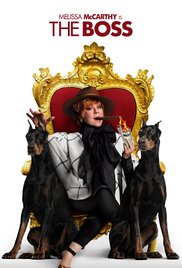
THE BOSS
US, 2016, 105 minutes, Colour.
Melissa Mc Carthy, Kristen Bell, Peter Dinglage, Kathy Bates, Tyler Labine, Margo Martindale.
Directed by Ben Falcone.
A Melissa Mc Carthy comedy. and fans know what to expect. She usually office a big, bumptious, dominating, insensitive-to-others character with a modicum of concession to sentiment at the end. With a title like The Boss, it couldn’t be otherwise. Nor is it.
This character of Michelle Darnell, her look, hair-do, throat-covering wardrobe, manner, manners, tough talk, was created by Melissa Mc Carthy over 15 years ago for some comedy routines. She certainly brings this bossy character to the screen very vividly. She works with her husband, writer and director, Ben Falcone, who usually has a cameo in her films. And he is usually is the butt of some kind of pushy joke.
In an amusing prologue, the young Michelle is shown at an orphanage from the 70s to the 90s, being taken by adopting parents but always returned – to the same sister, Margo Martindale, incidentally illustrating the change of habits for nuns over the decades. but, as an adult, Michelle has become the richest woman in America and flaunts it – at glitzy Donald Trump-like campaign, a mighty presence to her applauding and adoring fans.
But then she is arrested for insider training, goes to jail (rather comfortable, tennis playing, and her expecting a limousine to drive away after her release!).
What is she to do? Her loyal assistant, Claire, Kristin Bell, who has a young daughter and is a single mother, has been a great help but now forced to take on another job to make ends meet. Needless to, Michelle imposes herself on the family - though she does get some comeuppance in the very funny bed sequence. And, in the background, is Renault, really Ron, in love in her past life and now a a business rival, played by Peter Dinklage.
Can Michelle make a comeback? Nothing if not resourceful, Michelle goes to the parents’ meeting and listens to the project of selling Brownies to raise money. After insulting a lot of the mothers, she picks some of the girls, Claire’s daughter and a very tall aggressive young lady and forms her own Brownies company. Of course, she is successful – although there is a huge street fight between the traditional brownie sellers and Michelle’s girls (with some comic rough-and-tumble in the street fight in the street fight which is something of a worry about the culture of American slug-it-out solutions).
Despite some appearances of having reformed, Michelle is still wary about business deals, unscrupulous in dealing with friends, especially Claire, but Claire becomes less mousey and more assertive. Michelle has a confrontation with Renault. And, perhaps, there is a multi-million-dollar future in Brownies.
Better than some Melissa Mc Carthy films like Tammy but not so impactful as The Heat or Spy.
1. Melissa Mc Carthy comedy, tough, rough, sentiment?
2. The orphanage, the different decades, the business world, spectacular rallies, prison, the streets, Claire’s place, school, at Claire’s office, the creation of business, the fight in the streets, success, rivals? An urban story?
3. Melissa Mc Carthy, her screen persona, larger-than-life, bumptious, sure, arrogant, dominating, disregarding others, making apologies, perhaps learning some lessons – for the time being?
4. The orphanage, the nun, the adoptive parents, returning Michelle? Her decision to succeed? Creating her own back story?
5. The rally, spectacular, the crowds, the applause, Claire and her work, assistant, being exploited, the result of the arrest?
6. The prison scenes, Michelle and her hardships – and playing tennis etc? Getting out, expecting a limousine, stuck in the street, squatting, Claire and her daughter, the decision to stay with them, commandeering things, on the bed and smashing her against the wall? Her being fastidious and critical? Determined to get her life back?
7. Claire, her skills, loyal work for Michelle, quiet, the new job, the worker and his attentions, her boss, dominating, kowtowing to Michelle? The discussions, hating the job? Claire and her daughter, the bond between the two? At school? The parents’ meeting, the making of the Brownies, the volunteers and sales? The dominant mother and her daughter, standing up to Michelle, calling her a felon? Michelle and her threats? Michelle taking over, the reaction of the chairwoman, the reactions? Michelle going to Claire’s office, the boss fawning on her, Claire leaving?
8. The business idea, control, the schoolgirl recruits, the tough big girl, the confrontation in the street, the fight? The mother and daughter, criticisms – and the mother with the bed? Success, cash flow? Using business principles?
9. Ron, Renault, the past, the relationship between the two, his staff and his yes-man assistant? His success in business, triumphing over Michelle’s losses, getting into the building? Control? Michelle seeing Kristen with him, her misinterpretation, her decision to sell the business, betrayal, discovery of the truth?
10. The plan to get the contract back, going surreptitiously into the building, Ron and the confrontation, Claire asserting herself and her ownership? The decision, collaboration? Finally in the mansion?
11. The heightened story as if it were reality – but a comic fantasy about the American dream?
Published in Movie Reviews
Published in
Movie Reviews
Tagged under
Saturday, 18 September 2021 20:00
Huntsman: Winter's War, The
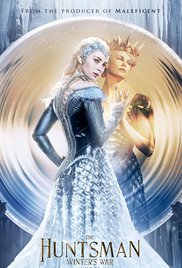
THE HUNTSMAN: WINTER'S WAR
US, 2016, 114 minutes, Colour.
Chris Hemsworth, Emily Blunt, Jessica Chasstain, Charlize Theron, Nick Frost, Rob Bryden, Sheridan Smith, Alexandra Roach, Sam Claffin.
Directed by Cedric Nicolas- Troyan.
In 2012 there was a Snow White story, Snow White and the Huntsman, a variation on the popular fairytale, which focused strongly on the wicked Queen and her interrogation of the mirror about who was the fairest in the land. The Queen was played with haughty beauty and arrogance by Charlize Theron. The film used some of the basics of the familiar fairytale but introduced the character of the Huntsman who was the champion of Snow White.
He was played by Chris Hemsworth had made an impression as Thor – and continued to make an impression as Thor in the sequel and in The Avengers films. Now he has been invited back to reprise his character of Eric, the Huntsman.
This film, in its early sequences is a prequel to Snow White and the Huntsman. There is a seven-year gap where audiences can fill in what they remember from the first film and the narrative then takes up as a sequel.
Once again there is Ravenna, the wicked Queen, shown instantly playing chess with the King and murdering him, assuming the throne, the younger sister, Freya (Emily Blunt) in attendance. And the mirror is once again reassuring. However, wicked queens will be wicked queens and Ravenna makes severe mischief for her sister, killing her child and banishing all love, Freya becoming an emotionless ice Queen in the northern kingdom in snnowclad mountains. Her henchman abduct children and bring them to the castle where they spend their time training in combat.
Two of the children stand out in martial arts, young Eric and young Sara. They are rivals but, in adulthood, Eric and Sara defy Freya and fall in love, trying to escape but are made to fight their fellow combatants until Freya builds an ice wall between them and deceives them as to what happens. Eric is Chris Hemsworth who becomes the Huntsman and Jessica Chastain is Sara.
And Ravenna has disappeared from the film – but fans of Charlize Theron need to remain patient.
A caption tells us that seven years pass – the time when Eric helped Snow White, but a message comes to him in the forest that the mirror has been stolen and Eric is persuaded to go on a mission to recover it, suddenly accompanied by two dwarves, played by Nick Frost and Rob Bryden, providing a lot of chatty patter and comedy. After denouncing female dwarves, two of them turn up, played by Sheridan Smith and Alexandra Roach, and they accompany the mission for the mirror. Eric has been put upon by Freya’s henchman – but who should such suddenly turn up but Sara!
There are some adventures, a fight with a monstrous giant, Sara showing her ability with archery accuracy, but Freya arriving and preparations for combat for the grand finale.
The writers are in the vein of Game of Thrones – but with touches of Tolkein (or touches of Peter Jackson) and more than a touch of Frozen.
While Jessica Chastain speaks her Scots accent very clearly, It is a pity that Chris Hemsworth, with his deep voice, is difficult to understand with what he calls his Celtic accent.
Familiar material, popularly enjoyable but not memorable.
1. The popularity of the original film, characters? Adaptation of a fairytale? Imagination?
2. This film as both prequel and sequel?
3. The director, commenting on fairytales, characters, interactions, endings?
4. The medieval settings, castles, architecture? The north, the castle of ice, in the mountains, snow and ice, the forests, the magic woods? The musical score?
5. The range of action, special effects? The mirror, the Queen, the ice and the capacity for freezing? The combat training for the children? Fights, the confrontation of a monster, phrases henchman? The end, the final combat, the weapons?
6. Ravenna, the mirror, memories of her being the evil queen in the first film? Playing chess with the King, outwitting him, killing him? Becoming Queen? Her relationship with her sister, saying that she knew everything? Freya’s pregnancy? The birth of the child, Ravenna destroying the child, transforming Freya into a Queen of hate?
7. Freya, younger sister, in love, the pregnancy, the birth of the child, sitting with the baby, the destruction of the baby, her lover’s regrets, her heart growing cold, the influence of Ravenna?
8. Her travelling to the north, transforming, her hair, her eyes? Alone, the castle, kidnapping the children, the forbidding any emotions, her confrontation of the black boy, the training and her supervision, preparing them for combat?
9. Eric and Sara, kidnapped, as children, their skills, the rivalry, attraction, the kiss, defying Freya’s edicts? The plans, the escape, Freya knowing this?
10. Her forcing them to combat, their defeat of their fellow warriors? Freya and her creating the ice wall? Eric seeing Sara die? Sara seeing Eric running away? His being thrown inyo the river and floating away?
11. The seven years passing, Snow White as Queen, the audience filling in the background of the Huntsman and his work for her? The messenger coming, the mission to retrieve the mirror?
12. The appearance of the dwarves, the characters, patter, comedy, going along with Eric, wanting a reward?
13. At the Inn, Freya’s warriors and their attack, Eric defeated, Sara intervening? Her saying she was deceived, their love, difficulties in trust?
14. The dwarves, caught up in the net, the two female dwarves and their banter, decision to guide the group, warning about the goblins, finding the jewels?
15. The forest, the bridge, the mirror, the ogre, Eric fighting, cutting the bridge, Sara and her arrow, saving Eric?
16. Carrying the mirror, being captured by Freya, her freezing the two dwarves? Sara firing the arrow, aiming at her mother’s medal, withdrawing the arrow and Eric alive?
17. Freya, the court, asking the mirror? The reappearance of Ravenna, her appearance, beauty, power? The status between worlds? The build-up to the confrontation, the two sisters, Eric and the clash, the truth about the murder of Freya’s baby? Ravenna and the confrontation with Eric, his throwing his axe into the mirror? Her being vanquished?
18. Freya, dying, expressing her regrets, encouraging Eric and Sara?
19. Fairytale, the happy ending – but still a mystery of the mirror?
Published in Movie Reviews
Published in
Movie Reviews
Tagged under
Saturday, 18 September 2021 20:00
Remember/ Canada 2015
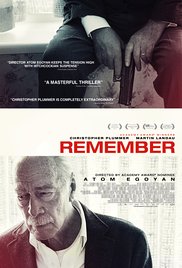
REMEMBER
Canada, 2015, 94 minutes, Colour.
Christopher Plummer, Martin Landau, Bruno Ganz, Jurgen Prochnow, Dean Norris, Henry Czerny.
Directed by Atom Egoyan.
One of the best films of the year with a most powerful impact. It is a film that can be thoroughly recommended and, after the final 10 minutes of the film, even more thoroughly recommended.
Remember has been directed by celebrated Canadian director, Atom Eagle yarn, who has been making powerful and striking films since the 1980s (and has one several ecumenical awards over the decades for Family Viewing, The Sweet Hereafter, Adoration).
The film was chosen for Australian screening in a series of films about the Holocaust. This is certainly the subject of the film even though the setting is 2015, over 70 years later. As the title indicates, we have to remember – but, the film explores the theme of memories, sadness, lies and deception, dementia and confusion, retribution.
Christopher Plummer, at the age of 85, portrays a man nearly 90, Zev Guttman, a survivor of Auschwitz, but all his family were killed. He is in a nursing home, suffering from confusion and moments of dementia, especially concerning his wife and he always calls out to her seeks her when he wakes, but she has died two weeks previously. In the nursing home, he has found a friend, Max (Martin Landau – 86 when he made this film and gives a powerful performance) who has been tracking down Nazis, associated with Simon Wiesenthal and his Nazi-hunting, who helps serve with the ritual celebrations in memory of his wife, and gives Zev a letter and a task to track down a commandant from Auschwitz who is responsible for the murder of families.
Christopher Plummer is in every scene, eliciting sympathy, eliciting concern, eliciting apprehension as he leaves the nursing home, takes a train with a prepaid ticket and an envelope of cash from Max, and pursues each of the names on the list to try to track down the officer from Auschwitz who has used the name Rudi Kurlander. In his quest, he finds several Rud I Kurlanders, two of whom are played strikingly by the German veteran actors Bruno Ganz and Jurgen Prochnow.
He travels across the United States with its extraordinary scenic beauty, going over the border into Canada, finally travelling by bus to Idaho, to Reno and to his final destination outside Tahoe. Meanwhile, his son and his wife, the son played by Henry Czerny, are anxious about their father and his disappearance, eventually tracking him down at a dramatic moment.
This is a film to be seen rather than described. It is particularly well written, tightly-written by Benjamin August, an atmospheric score by Mychael Danna, the excellent performances - and audiences being absorbed as well as disturbed, even up till the final moment.
As has been said twice, thoroughly recommended.
1. The powerful impact of the film? 70 plus years after the events?
2. The title, the word coming up only at the end, in light of the dramatic final scene? And the whole journey from Auschwitz to revenge? Dementia, confusion of memories, denial of memories?
3. The Canadian film, the director, his career, perspectives?
4. The American locations, Cleveland, the American border with Canada, Boise, Reno, Lake Tahoe, Canada and Ontario? The journey into beautiful North American scenery?
5. The musical score, for particular dramatic moments?
6. The introduction to Zev, his waking, confusion, asking for Ruth, in the nursing home, the kindly nurse, breakfast, the discussion with Max? The letter? The funeral, the ceremonies, Max present and praying (and the irony in the hindsight of the ending)? Zev reading the letter, discussions with Max, the cash in the envelope, the detailed plan, Zev agreeing? His relationship with his son and the son’s wife, their concern? Zev and the shrewdness in making his escape?
7. On the train, the ticket prepaid, discussions with Tyler, friendly, waking and looking for Ruth, taking the boy’s game? Apology, the boy and his brothers? The station, Tyler’s father and his kindness? The chauffeur, going to the hotel?
8. The nature of the mission, the name of Rudi Kurlander? The information, the background story, coming to America, changing names and identities, living lies, the Auschwitz background, the murder of families, the commandants?
9. The visit to the first Rudi? The house, downstairs, watching the television, Zev producing the gun, talking, the wrong identity, this man as a soldier with Rommel, the photos and proofs, his shame about what had happened to the Jews?
10. The buying of the gun, the man in the shop, being helpful, the licence, the small gun, the 9 mm Glock? Zev keeping it in his bag, at the border and putting his coat carelessly over it to conceal it?
11. The bus, the border, his licence, the passport out of date, checking, allowed to continue?
12. Going to the nursing home, the help with the room, accompaniment, the sick Rudi, Zev talking, the gun, seeing the number on the arm, the man being homosexual and interned in Auschwitz? Zev weeping (and the irony with the hindsight of the ending)?
13. The beauty of the Rockies, Idaho, the hotel, having the bath, waking, confusion, taking the taxi to the house? Having the money?
14. No one home, the vicious dog, the explosions in the distance, waiting the hours, John arriving home, policeman, welcoming, talking enthusiastically about his father, his father just dead? Selling the memorabilia, storing the others? Zev seeing the swastika, the SS uniform, the photos, the talk about Kristallnacht? The water, the whiskey? John seeing the number, his fierce anti-Semitism, denunciation of the Jews, setting the dog on Zev, Zev shooting it, John taunting him, Zev shooting him, twice? His wetting his trousers, the shower, phoning Max and explaining the wrong death? The taxi taking him away?
15. Going to Reno, crossing the street, knocked down, the hospital, watching the cartoons with the little girl, saying his wife would bring her candy, getting the girl to read the letter – and the audience being filled in with the background, the quest, Max’s influence, Nazi hunter? The phone call to his son?
16. The son, concern, the search, information from the taxi company, arriving at the house?
17. Max, Nazi hunter, in the home, the letter and the explanation, his recognising Zev, waiting until his wife’s death, helping with the funeral, sending him on a mission, financing it? Urging him to go to the police after the killing – so that he would be the subject of justice? The television commentary at the end, the residence and their comments, Max and his blunt statement about Zev/ Otto and his guilt?
18. Arriving at the home, the fourth Rudi, his daughter and granddaughter, pleasant talk, Rudi recognising him, coming down the steps, Zev’s threats? Rudi expecting him, the reality of Auschwitz, Zev accusing him of living lies so that he could not tell the truth, the gun, the threat to the girl, his son arriving, urging him to put down the gun, the telling the truth, about Auschwitz, many killings, the horror of the family, the truth about Zev and his real name, Zev remembering, shooting Rudi, killing himself?
19. The impact of the film up to this visit, the emotional and intellectual effect of the twist, the previous sympathies and their being
shattered?
20. What was the audience left with in terms of the Holocaust, Auschwitz, cruelty and murders, responsibilities?
Published in Movie Reviews
Published in
Movie Reviews
Tagged under
Saturday, 18 September 2021 20:00
Cat in the Hat, The
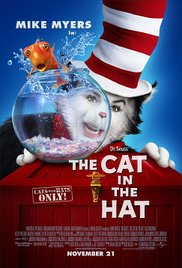
THE CAT IN THE HAT
US, 2003, 82 minutes, Colour.
Mike Myers, Dakota Fanning, Spencer Breslin, Kelly Preston, Alec Baldwin, Amy Hill, Sean Hayes.
Directed by Bo Welch.
Dr Seuss's stories have been popular in book form since the 1930s. When challenged to provide a story that children would read (with a vocabulary of only 200+words), he produced The Cat in the Hat in the late 50s and sold millions of copies.
In 2001, Ron Howard directed Jim Carrey in a version of Dr Seuss's How the Grinch Stole Christmas. Now we have Mike Myers as an ordinary 6 foot cat who takes Conrad and Sally on a whirlwind day of fun that makes Conrad (Spencer Breslin) realise how awful he is in being cantankerous and Sally (Dakota Fanning) realise how obsessive she is. (When her mother (Kelly Preston) lays down some rules for Conrad, she eagerly cries, "give me some".) The complication is that the next door neighbour Laurence (Alec Baldwin) wants to marry the children's mother. He is charming on the surface but underneath is a slob who wants to send Conrad to military school.
So, in fact, the Cat has a lot to contend with. Set designer turned director, Bo Welch, makes sure that the film looks good, plenty of bright pastel shades in a cardboard cutout town, bright costumes, everything colourful.
The Cat in the Hat is critic-proof. Young children will probably give it 10 out of 10. Parents might (probably will) find Mike Myers rather irritating as the Cat. His performance more than mirrors in voice, attitudes, body language and expressions Austin Powers, International Man of Mystery. Alec Baldwin's villainy is somewhat over the top, agreeable to the mother, disagreeable to the children, threatening the young boy with military school – but, he receives an outlandish comeuppance instead. Kelly Preston is the loving but hard-pressed mother. And Sean Hayes is her boss at work, very demanding, expecting everything to go perfectly for the social at her home that evening.
With the baby sitter who spends most of the time asleep, Conrad gets up to mischief under the disapproving eye of his sister. And then the Cat turns up , promising a mischievous day for the children who fall under his spell, the house becoming an absolute mess – but, the cat able to magically do a kind of Mary Poppins and clean the house instantly so that everything goes well for the party in the boy learns a bit of discipline and responsibility – and his sister some flexibility.
As has been mentioned, probably best for children – and the tolerant parents watching it.
Published in Movie Reviews
Published in
Movie Reviews
Tagged under
Saturday, 18 September 2021 20:00
My Angel/ Christmas Angel
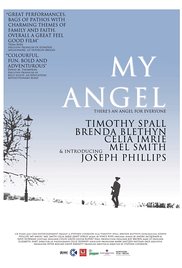
MY ANGEL/ CHRISTMAS ANGEL
UK, 2011, 90 minutes, Colour.
Timothy Spall, Brenda Blethyn, Joseph Phillips, Celia Imrie, Janet Dibley, Mel Smith, Angus Harrison.
Directed by Stephen Cookson.
My Angel/ Christmas Angel is a British Christmas story – in many ways very different from the very many American films made for television and Christmas celebrations, but with religious dimensions, albeit a touch of agnostic British society rather than American Christian churches, and plenty of sentiment.
It is something of a surprise to find Timothy Spall and Brenda Blethyn along with Celia Imrie and Mel Smith in the film. Timothy Spall plays a very sympathetic teacher who has lost his wife and suffered the death of one of his sons while the other ran away from home – and his daughter, deaf, employed at the school teaching French. Brenda Blethyn is the headmistress, a lonely middle-aged woman, flirting with the bereaved Mr Lambert, and rather extraneous to the rest of the film, drinking on Boxing Day with a wig mand mask, hoping to get some recognition in the media.
The film belongs to Joseph Phillips as Eddie, a 15-year-old, rather dreamy in his life who witnesses his mother being knocked down by a car and taken to hospital, in coma. He has a dream about an angel who asks him to find halo – which sets him on a rather emotional, even sentimental quest, asking for help about angels, with some British reserve and not knowing about angels, but Googling and eventually finding the statue of The Angel of the North in Newcastle and finding his true self.
A lot of sentiment, some awkwardness in the storytelling – and one wonders how a British audience would respond, emotionally and religiously, to this kind Christmas story.
1. A British Christmas story?
2. The London settings, the initial landmarks during the credits, West London, Slough, homes, streets, school, the hospital? The visit to the north, Newcastle, The Angel of the North?
3. The musical score, the songs, the lyrics relating to the plot and to Eddie’s quest?
4. The strong cast – for such a slight film and Christmas entertainment?
5. Eddie and his family, the absent father, Stewart as the old brother, Eddie at 15, his love his mother, at home, her concern, his being dreamy, going out, in the London streets, his mother impatient, going to charity work, her being knocked down by the car? Eddie’s response, her lying in the street?
6. The mother, in hospital, in coma? The visits? Stewart and his delayed visit, love his mother? Eddie and his vigils? The girl from school and her visit?
7. Eddie, his dream, the angel, talking to him, the quest, before Christmas Day? The halo? The angel? His anxiety, his search?
8. At school, Mr Lambert, in his office, the music, his dancing, the principal coming in, the pen, her dancing with him? Flirtatious? Mr Lambert, his dead wife, his absent son and his sadness? His deaf daughter, her being at the school, his relationship with her, her wanting to go to the carols, his staying behind?
9. Eddie, going to see Mr Lambert for help, the other teachers, not knowing much about angels? Scepticism? Mr Lambert, listening to him, no vacancies for extra studies? Mr Lambert being touched, remembering his wife, talking to the headmistress, the decision to help? The discussions with Eddie? Internet search? The files, looking over them?
10. The headmistress, lonely, and her drinking, at home, Christmas, the phone call, her giving information, wanting to be in the news, supplying a photo, praising Eddie, the clue about the angel?
11. The kindly librarian, listening to Eddie, not being able to help, but making suggestions?
12. The other boys, the bikes, taking Eddie’s bike, his looking out the headmaster’s window and chasing them?
13. Stewart, absent from home, the bond between the two boys, trying to survive, cooking, the money from his mother’s purse? His concern about Eddie, going to uncle Richard, his detection background, the search for Eddie, the contacts with the Newcastle police?
14. Eddie, the information about people seeing angels, the timetable, travelling to the north, the kindly people in the carriage, in Newcastle, taking the bike, the private property, going to see the Angel of the North, the silhouette in the light? The realisation from the angel that the halo was within and one had to discover that?
15. Mr Lambert, kindly, inviting Eddie and his brother to Christmas, his daughter and her support of this?
16. Eddie, found, going to see his mother, Christmas Day, finding his halo, her recovery?
17. Boxing Day, the headmistress with her mask, the phone call, her drinking?
18. A year later, the Lamberts, Eddie and his family – and the toast?
19. The Christmas story – with sentiment? Audience response to the theme of angels, their existence, guarding, halos, within?
Published in Movie Reviews
Published in
Movie Reviews
Tagged under
Saturday, 18 September 2021 20:00
Devil is a Sissy, The
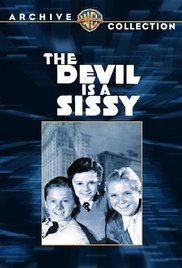
THE DEVIL IS A SISSY
US, 1936, 93 minutes, Black and white.
Freddie Bartholomew, Jackie Cooper, Mickey Rooney, Ian Hunter, Peggy Conklin, Katherine Alexander, Gene Lockhart, Kathleen Lockhart, Jonathan Hale, Grant Mitchell, Etta Mc Daniel.
Directed by W.S.Van Dyke.
Freddie Bartholomew had been chosen to be the lead in MGM’s David Copperfield. He came from Britain and appeared in a number of MGM films at this time including Anna Karenina and Captains Courageous.
Mickey Rooney had appeared in quite a number of films in small roles as the son but was soon to appear as Andy Hardy, join Judy Garland in musicals and have a career which lasted from the 1930s to the 2010s. Jackie Cooper had appeared with Wallace Beery in The Champ, was to continue as an actor, including Perry Mason in the Superman films, and as a director. Ian Hunter was a stalwart of so many films at this time and is the benign father of Freddie Bartholomew. Peggy Conklin has an Arthur Freed – Nacio Herb Brown song. Jonathan Hale has a strong role as the sympathetic judge and there is a glimpse of Hattie Mc Daniel’s sister, Etta Mc Daniel as Peggy Conklin’s maid. Gene Lockhart appears with his wife as Jackie Cooper’s parents, he bullying veteran of World War I.
There are a number of films about gangs in the 1930s, more especially at Warner Brothers, with the Dead End Kids. This is a benign moralising story about three boys, a sense of belonging, especially for an English boy with the tough Americans in the neighbourhood. It involves stealing, some surly attitudes, an appearance in court, parole officers – and a melodramatic climax when the boys run away only to be given a lift by some criminals, Freddie Bartholomew saving the day by being able to speak French to a French cook in the diner and his calling the police.
One of the many films from W.S. Van Dyke at MGM during the 1930s in the early 1940s.
1. MGM in the 1930s? New York setting, teenagers, delinquency, a cautionary tale?
2. The title, as explained by the judge exhorting the boys to have the courage of their convictions? The devil as an angel tossed out of heaven because he could not cope?
3. The black-and-white photography, New York, the neighbourhood, Park Avenue, the streets, the court, the countryside, the musical score, the song?
4. The Pierce family, the mother and her wealth, separation from her husband, the six months custody of Claude, his age?
5. The six months in the apartment, short of cash, his father as an architect, artist? A good man, relationship with his son?
6. Claude going to school, the teacher, the seat, Gig arriving, pushing him, the treatment from the other boys? Limey?
7. Mickey Rooney as Gig? His father, criminal, to be executed? The mother and her grief? The priest arriving at the house, his consolation, the final words of love, and saying that in a few hours he would know what the others were guessing at? Gig, his friends, at school, wanting the $80 to get a headstone?
8. Buck, Jackie Cooper, the leader, older, the friendship with the group, his leadership, his harsh father and the beatings?
9. Gig, his mother and the new suitor, Gig’s anger? His mother’s sister, looked down on by everyone, the money and the support, shady, Park Avenue apartment? Her encounter with Claude’s father?
10. The car, the group, accepting Claude and not accepting him? His wanting to be part of the group?
11. Claude, Freddie Bartholomew, his life, age? With his father, respectable? Wanting to belong, the gift of the football, the broken window, the headmaster, his confessing? The headmaster knowing what happened and challenging the boys? Strapping Gig, Buck and his carry on?
12. The tombstone, $80 as a deposit, arguing with the owner? The bargain, the stone, the angel? Stealing the tyres, Claude on the lookout, unable to whistle, the policeman whistling, the boys running away? The alternative, stealing the toys, from the apartment of his mother?
13. Their being reported, the court, the parents present, the judge and his fair treatment, sitting Buck’s father down, Claude’s father in the testimony about Gig’s aunt? The judge in chambers, the tough talk, trying to persuade the boys to be better? Parole?
14. The aftermath, in the car, not wanting to report to the parole officer, running away to Africa? Claude hearing this?
15. Claude, the rain, his cold, his father and Gig’s aunt, shopping, Claude going to the cemetery, warning the boys, hitchhiking, the criminals in the car, the diner, the threats, wanting Italian food, the French cook, Claude talking in French – and the police coming and taking the criminals?
16. Claude, sick, in hospital, his mother and her tantrums, taking him away? The father, Gig’s aunt, their care? The boys coming, talking to Claude, his recovery?
17. The theme of teenagers, gangs, thugs in New York City – a moralising story, MGM and benign style compared with the tough Warner Brothers stories?
Published in Movie Reviews
Published in
Movie Reviews
Tagged under
Saturday, 18 September 2021 20:00
Misunderstood/ Incompresa
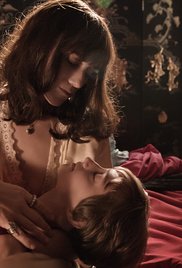
MISUNDERSTOOD/ INCOMPRESA
Italy, 2014, 103 minutes, Colour.
Giulia Salerno, Charlotte Gainsbourg, Gabriel Garko.
Directed by Asia Argento.
The title, Misunderstood, applies to a nine-year-old girl, Aria, played very effectively by Giulia Salerno.
The film is directed by Asia Argento, whose second name was Aria (because the baptising priest did not consider Asia as a proper name). Her father was the celebrated director of horror films, Dario Argento, and used his daughter in a number of films as she developed as an actress and later moved into direction. One of the main questions that arises in audience minds is how much of this film is autobiographical, Aria as Asia’s experience or an imaginative variation on the theme.
The setting is 1984, with her father having an acting career, her mother being a musician and touring, a celebrity. She has two older sisters. But the atmosphere in the house is poisonous, the parents continually fighting, and exhibiting quite erratic behaviour towards their children. Eventually, the father moves out into his own apartment, taking his oldest daughter, Lucrezia to live with him. Aria goes to pay visits, is often welcomed, but it is often made to feel out of place and she returns to her mother, her mother not always able to care for her because of touring. There are also various men in attendance on her mother.
She has a best friend at school and they share everything. Aria is also praised by the teacher, a prissy young woman, for her ability to write essays – and later Aria wins a Roman competition and goes to read her essay and receive her award, imagining her parents there but the reserved seats are vacant.
Aria is humiliated at the end when she throws a party at her father’s house, the children from school all turn up, but they wreak revenge on her in the kissing game where she thinks that the attractive young boy is in the dark room but it is really an antagonistic boy whose nickname is Fatso.
Aria goes to a ledge, falls over, injures herself and receives treatment in hospital – with a final speech to the audience about her life, its meaning, her future.
1. The film about an Italian family, Italian society, the 1980s and the influence?
2. The work of the director, her name, the film as biographical, portrait of family, family pressures?
3. Rome in the 1980s, the city, the apartments, different homes, school? The musical score?
4. The title? As it applied to Aria? Her perspective on life, nine years old, her mother, the celebrity, erratic behaviour in the house, love for her daughter, her moods? Her father, love, his emotional reactions, walking out? The sisters? Lucrezia, older, pampered, leaving with her father? Donatina, the middle daughter, at home, sharing with Aria? The details of life at home, the meals, moods, Aria not eating, her bedroom, the night brace for her mouth?
5. Aria at school, coming out of herself, her friend, their sharing so much, love for each other, the clash with the rival, Maria Teresa, the friend later joining up with her? Adriano from the market? The other boys at school? Fatso? In class, Aria being bright, her essays, about her friendship and looking at the girl while reading it? The competition and her winning?
6. The teacher, and proper, ridiculing the children, saying that Fatso should be called Dumbo? Her favouritism towards Aria?
7. The father, his career in films, clashes with his wife, the children together, packing and leaving, the emotional abruptness? His apartment, taking Lucrezia? Aria, the visits, the ups and downs of the moods? His taking her to the rock concert? The enjoyment? Yet her being ousted?
8. Her mother, absences, concerts? Autographs? Aria giving her the flower bracelet and her mother leaving it? The elderly gentleman and his attentions? Rick, sound engineer, the affair with the mother? The men and the giving gifts to the girls? Talking, dancing? The background of the glamorous life, the mother playing the piano – and the neighbour calling out to stop? Aria continuing to come back, her mother unable to look after her, Aria and her deciding to run away? In the street, with the group singing?
9. Winning the competition, the teachers and their applause, the seats reserved for her parents, her imagining them there, their absence?
10. Lucrezia, her pink room, dominating her sister? The contrast with Donatina and her love for her sister?
11. Aria, going to her father’s house, his absence, dismissing the staff, arranging the party, lavish, the decorations, cakes? The invitations at school? Everybody turning up? The singing and dancing? The kissing game, going to the darkened room, Aria thinking it was Adriano when it was actually Fatso, his triumph over her, the children all laughing and abandoning Aria?
12. Aria, her age, alone, feeling abandoned, standing at the railing, her fall? In hospital, the concerns?
13. Her recovery, her final speech about life, about herself, about her future?
Published in Movie Reviews
Published in
Movie Reviews
Tagged under
Saturday, 18 September 2021 20:00
Liaisons Dangereuses, Les
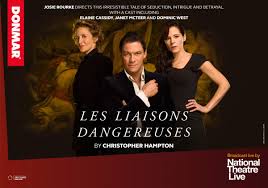
LES LIAISONS DANGEREUSES
UK, 2016, 180 minutes, Colour.
Dominic West, Janet Mc Ateer, Elaine Cassidy, Morfydd Clark, Edward Holcroft, Una Stubbs.
Directed by Josie Rourke.
This is a filmed version by the British National Theatre of a performance in the Donmar Warehouse, London in 2015-2016.
It is a revival of the play by Christopher Hampton, his adaptation of the 1782 French novel by Choderlos de Laclos. The play was first performed in the 1980s with great success in London’s West as well as on Broadway, a star vehicle for Alan Rickman and Lindsay Duncan. However, when a screen version was made in 1988, directed by Stephen Frears, the two stars were not so well-known and so the roles were taken by John Malkovich and Glenn Close. (Ironically, that same year, Alan Rickman appeared as the arch-villain in Die Hard which made his film career as well.)
Other films from the novel include a 1960s contemporary version with Gerard Philippe and Jeanne Moreau, a colourful period version, Valmont, with Colin Firth and Annette Bening, directed by Milos forman, 1990, and in 1999 a modern version with a younger cast, Cruel Intentions. In more recent times there has been a Chinese version.
The stage of the Donmar Warehouse is comparatively small and the audience is able to sit in front as well as on the two sides – and are sometimes visible during the filming. The set is quite elaborate, 18th-century classic – though with a touch of the faded gentility, by candles and chandeliers, with furniture of the period and, of course, beautiful costumes.
The central roles are taken by Dominic West and Janet Mc Teer, with Elaine Cassidy.
The play opens with the two central characters, former lovers, but now living quite amoral, immoral lives, involved in changing partners and seduction. The first scene has them plotting. Valmont has as his target a pious wife, Madame Tourvel, impervious to his attentions, her husband absent, and her being a good woman amidst this world of wealth, power, sexual exploitation. Madame de Merteuil is even more devious than Valmont, wanting revenge on a former suitor who has abandoned her and wants to make a more advantageous marriage, to young girl just out of her convent education. Madame wants Valmont to seduce her and then she will help him with his conquest.
Thus, the scene is set for this hothouse melodrama, the action of which takes place seven years before the French revolution – which some might consider did not come a moment too soon.
Other characters introduced are the young girl from the convent and her ambitious mother, formerly a courtesan but now very respectable, Valmont’s aunt (Una Stubbs) who entertains him and his target at her country estate, and a Chevalier who is infatuated with the young woman but gets entangled by Madame. There are various servants who connive at the action.
The main action of the film is Valmont’s courting of the young woman, her resistance, his persistence, her asking him to go away, his giving plausible reasons for returning, the emotional effect on her and her final succumbing to his seduction. And there is her final disillusionment as he breaks with her, even though he loves her. In the meantime, Madame continues on her way, exercising her wiles, exercising her wit, relishing her power, glad of the seduction of the young woman and her revenge, but entangling herself with the young Chevalier. Valmont, angry, challenges the Chevalier to a duel – to his death.
Dominic West struts the stage with quite some energy as Belmont, clever, charming, insinuating, but trying to resist his discovery of actual love. Janet Mc Teer is extraordinary in her impersonation of Madame, standing up for women, their domination, the control – a woman of power. At one stage towards the end, she is momentarily moved and sheds tear. In Stephen Frears’ film, at the end, Glenn Close as Madame is sitting at a mirror, removing her make up, reflecting, and a tear forms in the corner of her eye. In this version, Madame steels herself, looks out at the audience and determines that the competition will go on.
Well worth seeing in itself, but is interesting in its complementarity with the film version.
Published in Movie Reviews
Published in
Movie Reviews
Tagged under
Saturday, 18 September 2021 20:00
Kung Fu Panda 3

KUNG FU PANDA 3
US, 2016, 95 minutes, Colour.
Jack Black, Bryan Cranston, Dustin Hoffman, Angelina Jolie, J.A. Simmons, Jackie Chan, Seth Rogen, Lucy Liu, David Cross, Kate Hudson, James Hong, Randall Duk Kim, Wayne Knight.
Directed by Alessandro Carloni, Jennifer Yuh.
It is eight years since we were introduced to the large and jovial Panda, Po. He delighted audiences all round the world, he and his extended family, with some action and adventures and drawing on some Eastern aspects of martial arts as well as religious reflection. Three years later, he and his friends all returned for another comedy and action about.
There must be a great number of fans of the Kung Fu Panda out there, children eager to see him again – and children who are now older but still have fond memories. They will not be disappointed with this third time round.
By this stage, Po is fairly well established and well respected in his community. However, he is away from his village and, to his surprise and delight, his father comes to visit and takes them back to the village full of pandas - quite a comic lot. That would be enjoyable in itself, with lots of comic touches and, especially, with a rather large cast of celebrity voices who are all back again, Dustin Hoffman as Mr Shifu the tiny instructor, Angelina Jolie Lee as the tigress, Seth Rogen, Lucy Liu, David Cross, James Hong, Jackie Chan…
But, of course, this would not be a Kung Fu Panda entertainment without some battlelines being drawn. The mystic Oogway returns and is confronted by the villain Kai whom he had conquered and confined to the other world 500 years earlier. This monstrous type, resembling a giant and sinister ox, is determined to take over the whole world. Kai has in his power, minute green creatures whom he carries on his belt, the forces whom he has subdued – and he proceeds to subdue a whole lot of creatures from the village, including Mr Shifu, turning them all green, depriving them of their personalities and making them all fighting machines.
Po, of course, has to confront this sinister and powerful enemy, supported by his family and friends in the village, although discovering that his father has rather exaggerated his own powers.
For those who enjoy the battles, they are extraordinarily choreographed, exciting for the younger audiences (though Kai is particularly fierce, looming and frightening perhaps for the very young). Adult audiences who admire the skills of animation (done in the United States, in China and in India) will be captivated by the extraordinary detail of action and movement.
While Po is a valiant warrior on his own, he is in danger of defeat unless his father and the whole village combine with each other, eliciting their inner Chi, turning their combined energy and force on Kai. Po is a delighted victor but faces the question of whether he stays in eternity or returns to his family. Really, no question at all.
Jack Black is back with his comic energy as Po, and J.K. Simmons is truly a sinister Kai.
And, with the atmosphere of eastern mysticism, the exercise of inner Chi, complimentary forces in Yin and Yang, and the strength of the inner self, the film ends with an exuberant dance of life.
1. The popularity of Po, pandas, the other characters, the range of animals, the comic forms? A new sequel?
2. The characters, Po, the pandas, friends and helpless, Po’s father? The blend of the serious with the humorous?
3. The celebrity voice cast and the variety?
4. The Asian setting, pandas from Asia, the other animals, forming the community, forming the family? Experiencing conflict?
5. Po and his past, initially overweight, awkward, being transformed, the role of Mr Shifu, his growing, the martial arts, his becoming a Master, the training, his success? The nature of his adventures? Relationships?
6. The older Po, wiser, the visit from his father, his happy reaction, reunited, travelling to the village, discovering all the pandas – and the humorous range of shapes and sizes, holding young, comic and serious? Is being welcomed back? The importance of the goose who adopted him?
7. The village, the characters, living in harmony, Po idolising his father?
8. The appearance of Kai, the confrontation with Kwai, rivalry, the 500 years of defeat, Kai rising again, issuing a challenge? His size, appearance, voice? Dark and menacing?
9. Kai, the energy of the creatures he had transformed, green, compact, on his belt? His using them as weapons? His transformation of characters from the village, including Mr Shifu, becoming warriors and weapons?
10. Po’s father, admitting the truth, that he did not have the answers? The responsibility going back to Po? The preparations for the attack, the slapstick comedy with training the pandas and their particular techniques, even from the kitchen?
11. The attack, Kai and his viciousness, the green warriors, the confrontations? The elaborate fights, the range of choreography?
12. The buildup to the confrontation between Po and Kai, the immortal who cannot be destroyed, Po and his attempts, failure? His realisation, on to Kai’s back and repeating the formula that would make him disappear – he would sacrifice himself and go with him?
13. Po, the fight in the other world, the defeat? Po’s father, asking everybody to combine, their inner energy, holding up their paws, radiating the energy, saving Po, his final confrontation with the defeat of Kai?
14. His energy, his becoming the dragon warrior, the visualising of the lights and the dragon?
15. The discussions with Ooglay, whether he should return or not? His becoming Ooglay’s heir, the staff? The decision to go home,
everybody welcoming, everybody transformed and restored? Mr Shifu asking Po for instruction?
16. The Eastern background of Chi, Yin and Yang, inner strength?
17. The finale with everyone participating in a dance of life?
Published in Movie Reviews
Published in
Movie Reviews
Tagged under